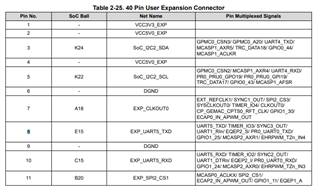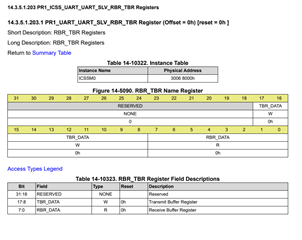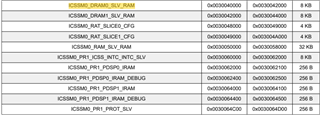I'm trying to do a UART serial loopback through the AM625 PRU, however, it's not working as desired, even using the Texas examples. Basically, TX/RX doesn't work.
The version of Code Composer Studio is 12.6.0.00008
I'm using the firmware that comes directly from the Texas Intruments website: tisdk-default-image-am62xx-evm.wic. I didn't configure anything different in it, just using the default version.
Below is the code attached and a video of the unexpected situation. Thanks
The code is here:
#include <stdint.h>
#include <pru_uart.h>
#include "resource_table.h"
#define FIFO_SIZE 16
#define MAX_CHARS 8
#define TX_PR0_UART_PINMUX ( *( volatile uint32_t * )( 0x000F41DC ) )
#define RX_PR0_UART_PINMUX ( *( volatile uint32_t * )( 0x000F41D8 ) )
void main(void)
{
uint8_t tx = 0;
volatile uint8_t rx = 0;
uint8_t cnt = 0;
volatile uint32_t status_0 = 0;
volatile uint32_t status_1 = 0;
char* hostBuffer;
volatile uint32_t map_0 = 0;
volatile uint32_t map_1 = 0;
// PINMUX configuration for UART_PRU TX/RX on 40 pins expansions header
TX_PR0_UART_PINMUX &=~ 0b111;
TX_PR0_UART_PINMUX |= 0b110;
map_0 = TX_PR0_UART_PINMUX;
RX_PR0_UART_PINMUX &=~ 0b111;
RX_PR0_UART_PINMUX |= 0b110;
map_1 = RX_PR0_UART_PINMUX;
// 115200 baud rate - 16x oversample - 192MHz clk
CT_UART.DIVLSB_bit.DLL = 104;
CT_UART.DIVMSB_bit.DLH = 0b0;
CT_UART.MODE_bit.OSM_SEL = 0b0;
// INTERRUPTS:
// Receiver Data Available Interrupt
// Transmitter Holding Register Empty Interrupt
// Line Status Interrupt
CT_UART.INT_EN_bit.ERBI = 0b1;
CT_UART.INT_EN_bit.ETBEI = 0b1;
CT_UART.INT_EN_bit.ELSI = 0b1;
// FIFO config
CT_UART.INT_FIFO_bit.FCR_FIFOEN = 0b1;
CT_UART.INT_FIFO_bit.FCR_RXCLR = 0b1;
CT_UART.INT_FIFO_bit.FCR_TXCLR = 0b1;
CT_UART.INT_FIFO_bit.FCR_DMAMODE1 = 0b1;
// 8-bit word, 1 stop bit, no parity, no break control and no divisor latch
CT_UART.LCTR_bit.WLS0 = 0b1;
CT_UART.LCTR_bit.WLS1 = 0b1;
// enable UART to act free and enable TX RX
CT_UART.PWR_bit.FREE = 0b1;
CT_UART.PWR_bit.URRST = 0b1;
CT_UART.PWR_bit.UTRST = 0b1;
// Enable LOOPBACK and disable AFE and RTS functionality
CT_UART.MCTR_bit.LOOP = 0b0;
CT_UART.MCTR_bit.AFE = 0b0;
CT_UART.MCTR_bit.RTS = 0b0;
hostBuffer = "abc";
while(1)
{
cnt = 0;
while(1)
{
//status verify
status_0 = CT_UART.LSR1;
status_1 = CT_UART.INT_FIFO;
if ((tx = hostBuffer[cnt]) == '\0') break;
cnt++;
CT_UART.RBR_TBR_bit.TBR_DATA = tx;
//status verify
status_0 = CT_UART.LSR1;
status_1 = CT_UART.INT_FIFO;
while ( CT_UART.LSR1_bit.DR );
//status verify
status_0 = CT_UART.LSR1;
status_1 = CT_UART.INT_FIFO;
rx = CT_UART.RBR_TBR_bit.RBR_DATA;
//status verify
status_0 = CT_UART.LSR1;
status_1 = CT_UART.INT_FIFO;
while ( !CT_UART.LSR1_bit.TEMT );
}
}
// Disable UART before halting
CT_UART.PWR_bit.FREE = 0b0;
CT_UART.PWR_bit.URRST = 0b0;
CT_UART.PWR_bit.UTRST = 0b0;
// halt PRU core
__halt();
}
The video of the issue is here:





